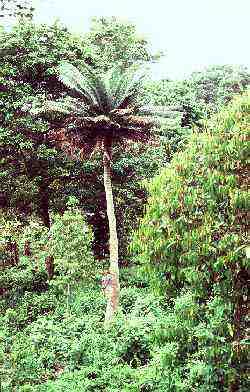 The natives of Guam use fadang — the seed of the false sago palm (a cycad) (photo) — as an ingredient in their traditional medicine and food.
The natives of Guam use fadang — the seed of the false sago palm (a cycad) (photo) — as an ingredient in their traditional medicine and food.
According to Marjorie Whiting, a nutritionist/anthropologist who lived with the native Guamanians, “Everybody knows that the fadang is toxic… The people go to a lot of trouble to process it in order to detoxify it.”
Now, we’re learning about the risk factors for toxicity they missed.
Dr. Amy Borenstein and associates from the University of South Florida in Tampa have reported a study of cycad-derived products as possible risk factors for dementia, mild cognitive impairment, and parkinsonism/dementia complex on Guam.
First, the details.
- Interviews were conducted with 166 Guamanians with dementia, 50 with mild cognitive impairment, and 21 with parkinsonism?dementia.
- In addition, 1,581 Guamanians without these conditions were interviewed.
And, the results.
- Picking, processing, and eating fadang during young adulthood were significantly associated with dementia, mild cognitive impairment, and parkinsonism/dementia later in life.
- Interestingly, no associations were found for consumption of fruit bats (they eat the fadang) or exposure to cycad used as a topical medicine and any of these outcomes.
The bottom line?
It’s an interesting public health issue. Guam citizens knew of its toxicity and were successful in detoxifying fadang for medical uses. But they ignored the potential for toxicty during day-to-day exposure.
8/22/07 20:37 JR